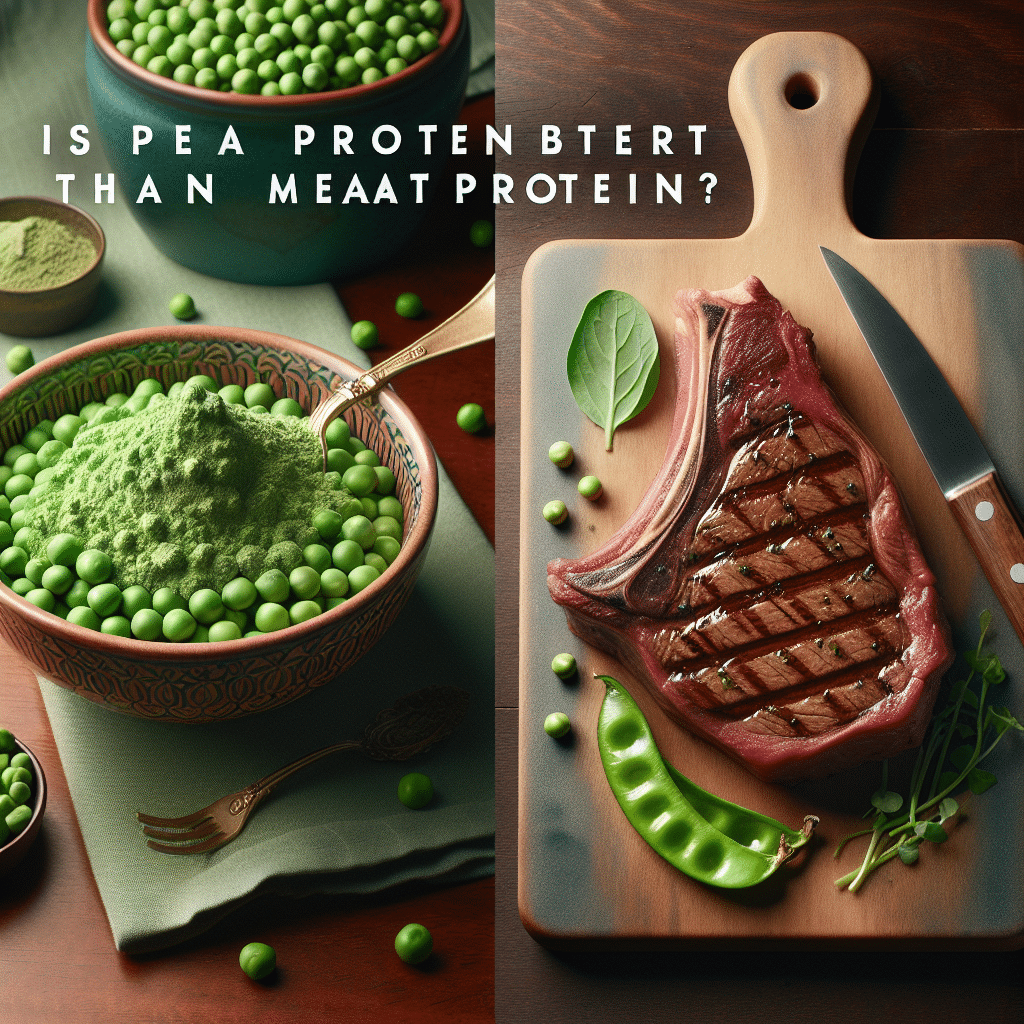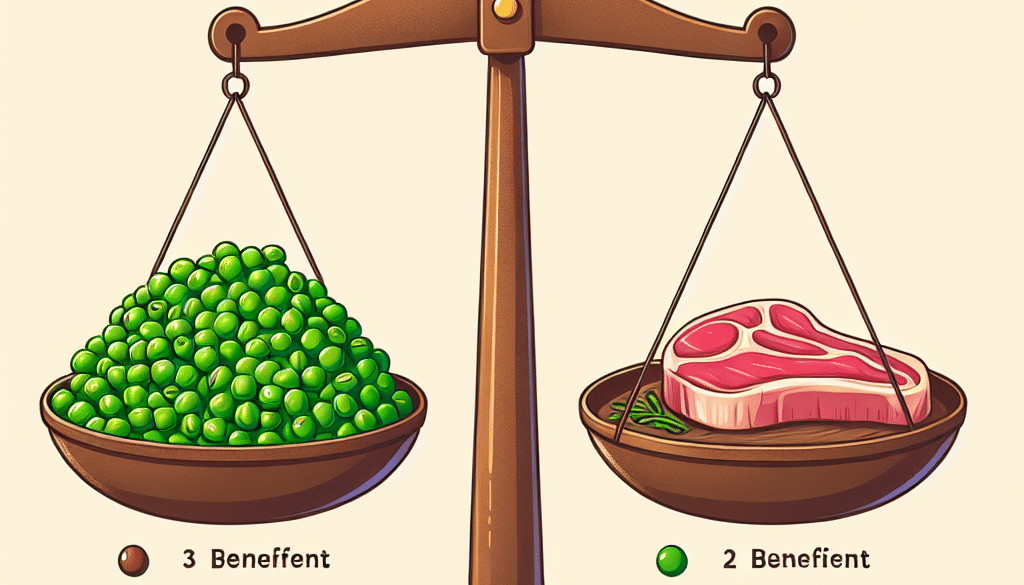Is Pea Protein Better Than Meat Protein? Learn More
Table of Contents
- Pea Protein vs. Meat Protein: Which is the Superior Source?
- Nutritional Comparison of Pea Protein and Meat Protein
- Health Implications of Pea Protein vs. Meat Protein
- Environmental Impact: Pea Protein vs. Meat Protein
- Case Studies and Statistics Supporting Pea Protein
- Consumer Preferences and Trends
- Conclusion: Weighing the Pros and Cons
- Discover ETprotein’s Premium Protein Products
Pea Protein vs. Meat Protein: Which is the Superior Source?

As the global population becomes more health-conscious and environmentally aware, the debate between plant-based proteins and animal-based proteins is more relevant than ever. Among the various plant-based alternatives, pea protein has emerged as a popular contender against traditional meat protein. This article delves into the nutritional aspects, environmental impact, and health benefits of pea protein compared to meat protein, providing a comprehensive analysis for consumers looking to make informed dietary choices.
Nutritional Comparison of Pea Protein and Meat Protein
When evaluating protein sources, it’s essential to consider their amino acid profiles, digestibility, and nutrient content. Here’s how pea protein and meat protein stack up against each other:
- Amino Acid Profile: Meat protein is a complete protein, containing all nine essential amino acids. Pea protein is also rich in amino acids but is slightly lower in methionine. However, when combined with other plant proteins, it can provide a complete amino acid profile.
- Digestibility: Meat proteins are generally highly digestible. Pea protein also boasts good digestibility, especially when processed to remove anti-nutritional factors.
- Nutrient Density: Meat provides additional nutrients like B vitamins, iron, and zinc. Pea protein is not naturally rich in these nutrients but is often fortified. It also offers the benefit of being low in fat and free from cholesterol.
Health Implications of Pea Protein vs. Meat Protein
Choosing between pea protein and meat protein can have different health implications. Here’s what research suggests:
- Heart Health: Studies have shown that plant-based proteins can lower the risk of heart disease. Pea protein is naturally cholesterol-free and lower in saturated fats, making it a heart-healthy option.
- Weight Management: Pea protein can aid in weight loss due to its ability to promote satiety. Meat protein also helps with satiety but may come with higher calories due to fat content.
- Digestive Health: Pea protein is often easier to digest for those with sensitivities to dairy or meat and is less likely to cause allergies.
Environmental Impact: Pea Protein vs. Meat Protein
The production of pea protein generally has a lower environmental footprint compared to meat protein. Here are some key points:
- Greenhouse Gas Emissions: Animal agriculture is a significant contributor to greenhouse gases, whereas peas require less energy to grow and process.
- Land Use: Meat production requires more land than pea cultivation, contributing to deforestation and habitat loss.
- Water Usage: Pea plants are drought-resistant and require less water than livestock farming.
Case Studies and Statistics Supporting Pea Protein
Several studies and market analyses have highlighted the growing popularity and benefits of pea protein:
- A study published in the Journal of the International Society of Sports Nutrition found that pea protein promoted muscle thickness gains just as effectively as dairy-based whey protein in athletes.
- According to a report by MarketsandMarkets, the global pea protein market size is projected to grow, indicating a rising demand for plant-based protein sources.
Consumer Preferences and Trends
Consumer trends show a shift towards plant-based proteins for various reasons:
- Health Concerns: People are choosing pea protein for its potential health benefits and lower allergenic potential.
- Ethical Choices: Ethical concerns regarding animal welfare are driving consumers towards plant-based proteins.
- Dietary Restrictions: Pea protein is suitable for vegetarians, vegans, and those with dietary restrictions like lactose intolerance.
Conclusion: Weighing the Pros and Cons
In conclusion, both pea protein and meat protein have their advantages and drawbacks. Pea protein offers a sustainable, allergen-friendly, and cholesterol-free alternative to meat protein, with a growing body of research supporting its health benefits. Meat protein, on the other hand, is a time-tested source of complete protein and essential nutrients. Ultimately, the choice between pea protein and meat protein depends on individual dietary needs, environmental concerns, and ethical considerations.
Discover ETprotein’s Premium Protein Products
If you’re looking to incorporate high-quality pea protein into your diet, ETprotein offers a range of organic bulk vegan proteins that cater to your health and environmental preferences. Their pea protein products are characterized by a neutral taste, non-GMO, and allergen-free attributes, ensuring you receive the best plant-based protein available.
About ETprotein:
ETprotein, a reputable protein and L-(+)-Ergothioneine (EGT) Chinese factory manufacturer and supplier, is renowned for producing, stocking, exporting, and delivering the highest quality organic bulk vegan proteins and L-(+)-Ergothioneine. They include Organic rice protein, clear rice protein, pea protein, clear pea protein, watermelon seed protein, pumpkin seed protein, sunflower seed protein, mung bean protein, peanut protein, and L-(+)-Ergothioneine EGT Pharmaceutical grade, L-(+)-Ergothioneine EGT food grade, L-(+)-Ergothioneine EGT cosmetic grade, L-(+)-Ergothioneine EGT reference grade and L-(+)-Ergothioneine EGT standard. Their offerings, characterized by a neutral taste, non-GMO, allergen-free attributes, with L-(+)-Ergothioneine purity over 98%, 99%, cater to a diverse range of industries. They serve nutraceutical, pharmaceutical, cosmeceutical, veterinary, as well as food and beverage finished product distributors, traders, and manufacturers across Europe, USA, Canada, Australia, Thailand, Japan, Korea, Brazil, and Chile, among others.
ETprotein specialization includes exporting and delivering tailor-made protein powder and finished nutritional supplements. Their extensive product range covers sectors like Food and Beverage, Sports Nutrition, Weight Management, Dietary Supplements, Health and Wellness Products, and Infant Formula, ensuring comprehensive solutions to meet all your protein needs.
As a trusted company by leading global food and beverage brands and Fortune 500 companies, ETprotein reinforces China’s reputation in the global arena. For more information or to sample their products, please contact them and email sales(at)ETprotein.com today.












